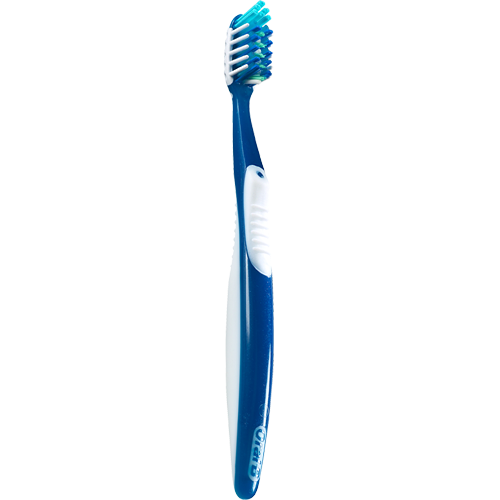
This image has format transparent PNG with resolution 500x500.
You can download this image in best resolution from this page and use it for design and web design.
Toothbrush PNG with transparent background you can download for free, just click on download button.
The toothbrush is an oral hygiene instrument used to clean the teeth, gums, and tongue. It consists of a head of tightly clustered bristle, atop of which toothpaste can be applied, mounted on a handle which facilitates the cleaning of hard-to-reach areas of the mouth.
Toothbrushes are available with different bristle textures, sizes, and forms. Most dentists recommend using a soft toothbrush since hard bristled toothbrushes can damage tooth enamel and irritate the gums.
Although first made as an oral hygiene instrument, the toothbrush has seen other use as a precise cleaning tool as well, most specifically in the military. This is because of the many small strands that allow it to clean in small places many conventional cleaning tools cannot reach.
Before the invention of the toothbrush, a variety of oral hygiene measures had been used. This has been verified by excavations during which chew sticks, tree twigs, bird feathers, animal bones and porcupine quills were recovered.
The predecessor of the toothbrush is the chew stick. Chew sticks were twigs with frayed ends used to brush the teeth while the other end was used as a toothpick. The earliest chew sticks were discovered in Sumer Mesopotamia in 3500 BC, an Egyptian tomb dating from 3000 BC, and mentioned in Chinese records dating from 1600 BC. The Greeks and Romans used toothpicks to clean their teeth, and toothpick-like twigs have been excavated in Qin Dynasty tombs. Chew sticks remain common in Africa, the rural Southern United States, and in the Islamic world the use of chewing stick Miswak is considered a pious action and has been prescribed to be used before every prayer five times a day. Miswaks have been used by Muslims since 7th century.
The first bristle toothbrush resembling the modern one was found in China. Used during the Tang Dynasty (619–907), it consisted of hog bristles.[8][9] The bristles were sourced from hogs living in Siberia and northern China because the colder temperatures provided firmer bristles. They were attached to a handle manufactured from bamboo or bone, forming a toothbrush. In 1223, Japanese Zen master D?gen Kigen recorded on Sh?b?genz? that he saw monks in China clean their teeth with brushes made of horsetail hairs attached to an oxbone handle. The bristle toothbrush spread to Europe, brought from China to Europe by travellers. It was adopted in Europe during the 17th century. The earliest identified use of the word toothbrush in English was in the autobiography of Anthony Wood who wrote in 1690 that he had bought a toothbrush from J. Barret. Europeans found the hog bristle toothbrushes imported from China too firm and preferred softer bristle toothbrushes made from horsehair. Mass-produced toothbrushes made with horse or boar bristle continued to be imported to England from China until the mid 20th century.
It has been discovered that compared to a manual brush, the multi-directional power brush might reduce the incidence of gingivitis and plaque, when compared to regular side-to-side brushing. These brushes tend to be more costly. An electric toothbrush performs rotations of its bristles and cleans hard to reach places. Most studies report performances equivalent to those of manual brushings, possibly with a decrease in plaque and gingivitis although the electric version can be more comfortable. An additional timer and pressure sensors can encourage a more efficient cleaning process.Electric toothbrushes can be classified, according to the speed of their movements as: standard power toothbrushes, sonic toothbrushes, or ultrasonic toothbrushes. Any electric toothbrush is technically a power toothbrush. If the motion of the toothbrush is sufficiently rapid to produce a hum in the audible frequency range (20 Hz to 20,000 Hz), it can be classified as a sonic toothbrush. Any electric toothbrush with movement faster than this limit can be classified as an ultrasonic toothbrush. Certain ultrasonic toothbrushes, such as the Megasonex and the Ultreo, have both sonic and ultrasonic movements.
Teeth can be damaged by several factors including poor oral hygiene, but also by wrong oral hygiene. Especially for sensitive teeth, damage to dentin and gums can be prevented by several measures including a correct brushing technique.
It is beneficial, when using a straight bristled brush, not to scrub horizontally over the necks of teeth, not to press the brush too hard against the teeth, to choose a toothpaste that is not too abrasive, and to wait at least 30 minutes after consumption of acidic food or drinks before brushing. The invention of the Collis CurveTM curved bristle toothbrush allows for a simplified simultaneous brushing technique described specifically for this brush. "The curved bristles rotate on their axes and slip into the sulcus as far as the junctional epithelium without lacerating it" Harder tooth brushes reduce plaque more efficiently but are more stressful to teeth and gum; using a medium to soft tooth brush for a longer cleaning time was rated to be the best compromise between cleaning result and gum and tooth health.
A study by University College London found that advice on brushing technique and frequency given by 10 national dental associations, toothpaste and toothbrush companies, and in dental textbooks was inconsistent.
It is not recommended to share toothbrushes with others, since besides general hygienic concerns, there is a risk of transmitting diseases that are typically transmittable by blood, such as Hepatitis C.
After use it is advisable to rinse the toothbrush with water, shake it off and let the toothbrush dry.
Bent and worn out bristles of a toothbrush lead to decreased cleaning efficiency. It is therefore recommended to change it for a new one when it appears to be worn out (roughly after 6–16 weeks).
In this page you can download free PNG images: Toothbrush PNG images free download